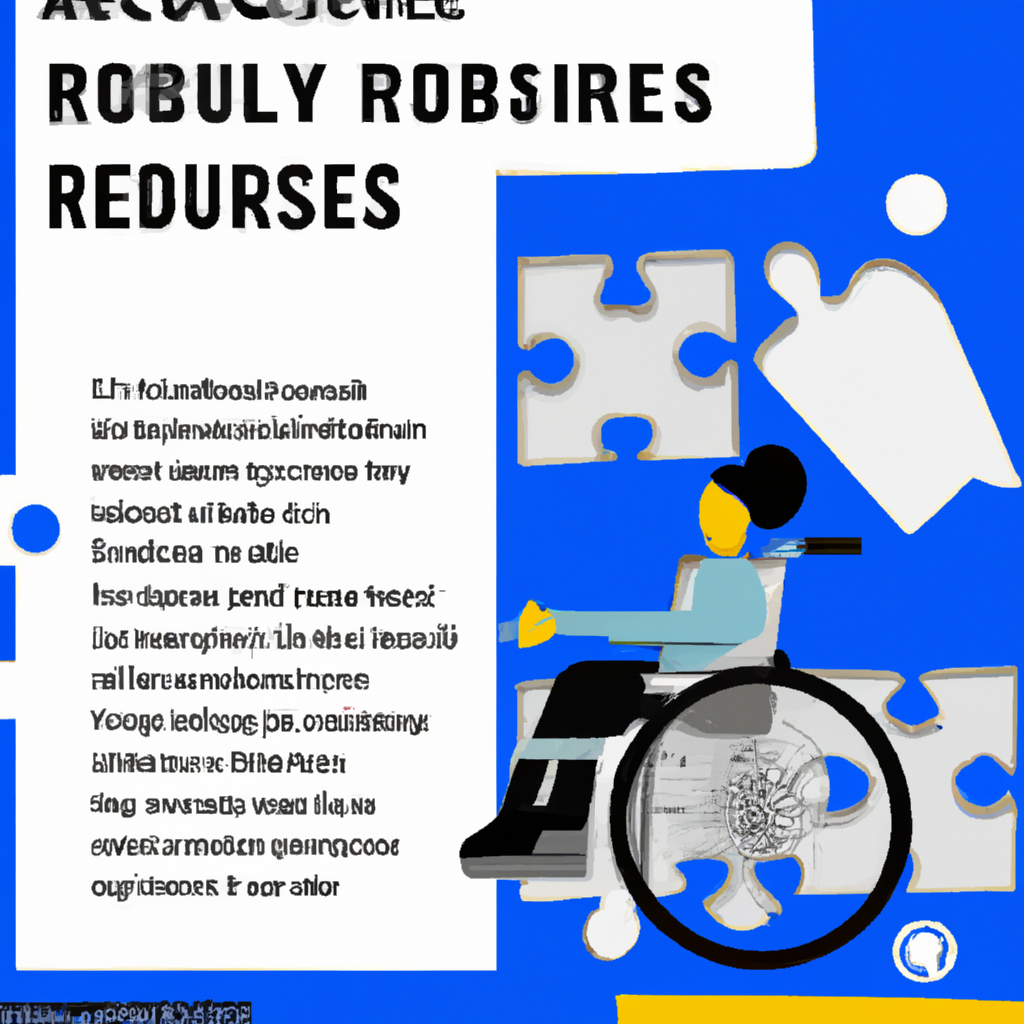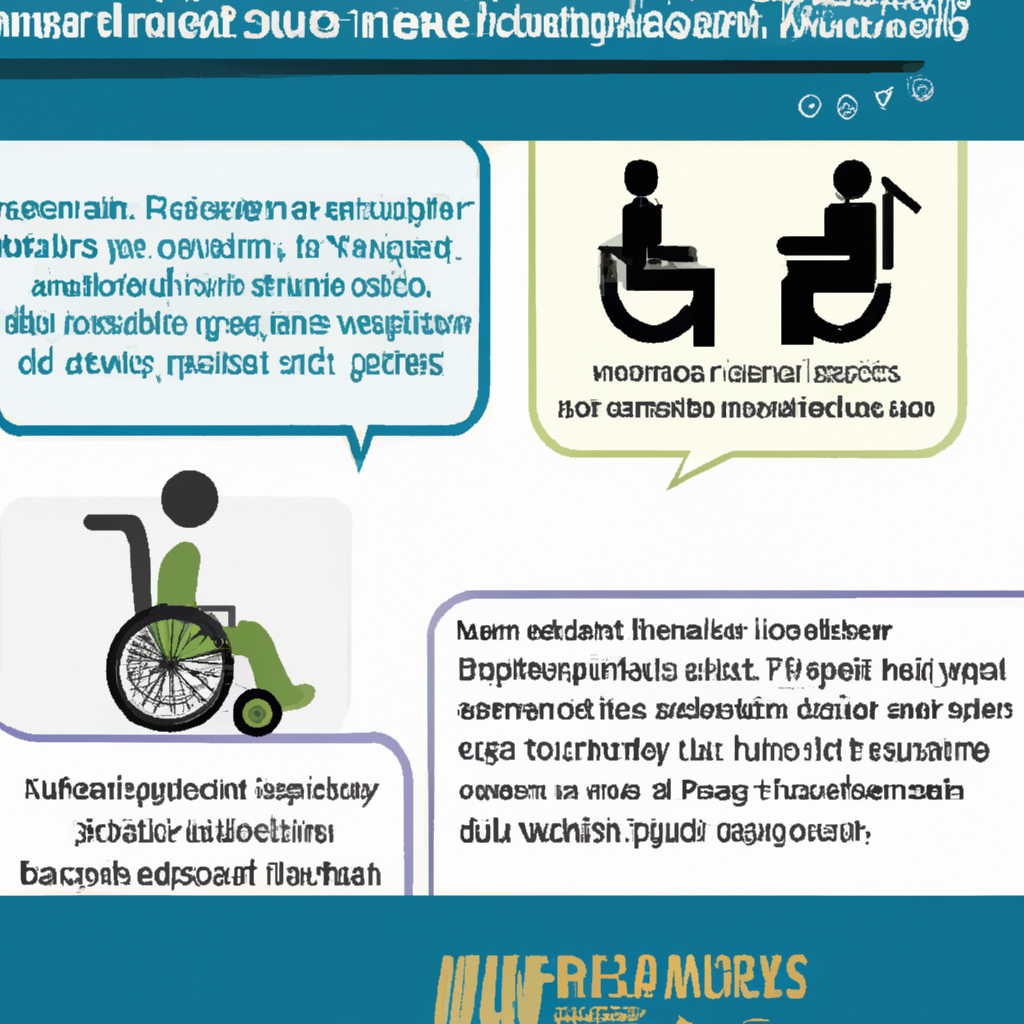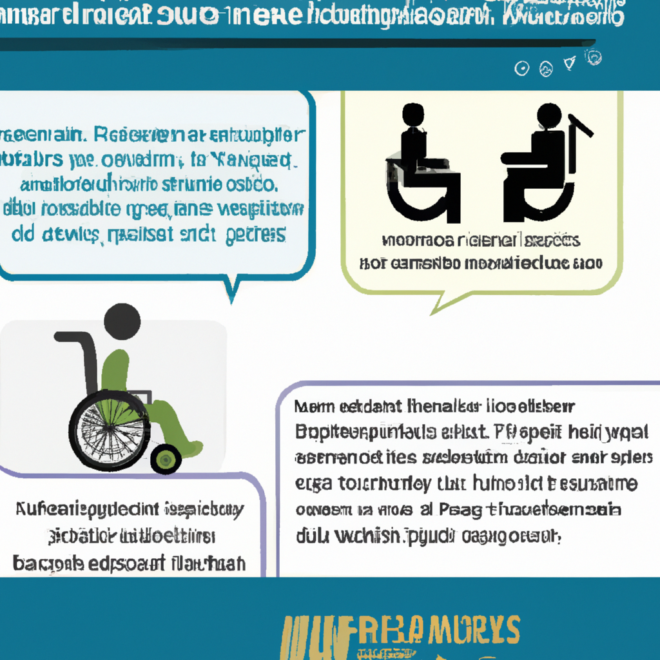Imagine you’re a job seeker with a disability, eager to join the workforce but unsure where to start. The good news is that there is a wealth of resources available to support you on your journey. From specialized job boards and career counseling services to government programs and disability-friendly employers, this article will provide you with an overview of the valuable resources that exist to help individuals with disabilities find meaningful employment opportunities. So, let’s explore the various avenues that can lead you to your dream job!

Government Programs
Social Security Disability Insurance (SSDI)
Social Security Disability Insurance (SSDI) is a government program designed to provide financial assistance to individuals with disabilities who are unable to work. If you have a disability and have worked for a certain number of years, you may be eligible to receive SSDI benefits. These benefits can help cover everyday expenses and provide some financial stability while you search for employment. To qualify for SSDI, you must meet the Social Security Administration’s definition of disability and have earned enough work credits.
Supplemental Security Income (SSI)
Supplemental Security Income (SSI) is another government program that provides financial assistance to individuals with disabilities who have limited income and resources. Unlike SSDI, SSI is a needs-based program that doesn’t require a work history or work credits. SSI benefits can help cover basic needs such as food, shelter, and clothing. To be eligible for SSI, you must have a disability, be a U.S. citizen or qualifying immigrant, and meet certain income and resource limits set by the Social Security Administration.
Ticket to Work Program
The Ticket to Work Program is a government initiative designed to help individuals with disabilities find employment and become self-sufficient. This program provides access to a variety of vocational rehabilitation services, job training programs, and other employment supports. By participating in the Ticket to Work Program, you can receive assistance from an employment network or state vocational rehabilitation agency to help you develop job skills, find job opportunities, and navigate the job market. The program also offers incentives and protections to ensure that individuals can transition to work without losing their disability benefits.
Job Placement Services
Vocational Rehabilitation Agencies
Vocational Rehabilitation Agencies are state-run organizations that provide a range of services to individuals with disabilities who are seeking employment. These agencies offer counseling and guidance, vocational evaluation, skills training, job placement assistance, and other supports to help individuals find and maintain meaningful employment. Vocational Rehabilitation Agencies work closely with job seekers with disabilities to develop individualized plans that address their unique needs and goals. They can also provide assistance with job accommodations, networking opportunities, and ongoing support after employment.
American Job Centers
American Job Centers, also known as One-Stop Career Centers, are federally-funded service centers that offer a variety of resources and support to job seekers, including those with disabilities. These centers provide access to job listings, career counseling, skills assessments, resume writing assistance, job training programs, and other employment-related services. American Job Centers often collaborate with vocational rehabilitation agencies and other community organizations to ensure that individuals with disabilities have access to the resources they need to find suitable employment. They may also provide information and referrals to additional disability-specific programs and services.
Disability-specific Employment Agencies
Disability-specific employment agencies specialize in matching job seekers with disabilities to appropriate job opportunities. These agencies often have expertise in working with individuals who have specific disabilities and understand the unique challenges they may face in the job market. They can provide personalized support and guidance throughout the job search process, including resume and interview preparation, job matching, and workplace accommodations. Disability-specific employment agencies collaborate with employers to promote inclusive hiring practices and ensure that individuals with disabilities have equal access to employment opportunities.
Training and Skill Development
Job Training Programs
Job training programs offer individuals with disabilities the opportunity to develop the skills and knowledge needed for specific occupations. These programs can range from short-term workshops and certifications to longer-term vocational training and apprenticeships. Job training programs are typically designed to provide hands-on experience and practical skills development, allowing participants to gain the necessary qualifications for particular jobs. Many vocational rehabilitation agencies, community colleges, trade schools, and nonprofit organizations offer job training programs tailored to the needs of individuals with disabilities.
On-the-Job Training (OJT)
On-the-Job Training (OJT) programs provide individuals with disabilities the opportunity to learn and acquire job skills while working in a real-world employment setting. Through OJT programs, job seekers can receive training and support directly from employers who are willing to provide a learning environment and skill development opportunities. OJT programs often involve a combination of supervised training and classroom instruction, allowing participants to acquire both practical skills and theoretical knowledge. These programs can be particularly beneficial for individuals with disabilities who learn best through hands-on experience.
Workforce Innovation and Opportunity Act (WIOA)
The Workforce Innovation and Opportunity Act (WIOA) is a federal law that aims to improve access to employment, education, training, and support services for individuals with disabilities. This program provides funding and support to state and local agencies, such as vocational rehabilitation agencies and community colleges, to help individuals with disabilities access a wide range of training and employment opportunities. WIOA programs focus on individualized career planning, skill development, and job placement services. They also promote inclusive hiring practices and the provision of reasonable accommodations in the workplace.

Job Search Websites
Disability-specific Job Boards
Disability-specific job boards are online platforms that focus specifically on job opportunities for individuals with disabilities. These job boards may cater to specific types of disabilities or provide a broader range of job listings for individuals with various disabilities. These platforms often allow users to search for jobs by location, industry, or specific disability-related criteria. Using disability-specific job boards can help job seekers with disabilities find employment opportunities that are inclusive and accommodating to their unique needs.
General Job Boards
General job boards are widely used platforms that feature a wide range of job listings across various industries and locations. While these job boards may not specifically cater to individuals with disabilities, they can still be highly valuable resources for job seekers with diverse abilities. Many general job boards provide search filters and accessibility features that allow individuals to find job opportunities that align with their skills and interests. It’s important for job seekers with disabilities to explore general job boards along with disability-specific platforms to maximize their chances of finding suitable employment.
Job Boards with Disability-friendly Features
Some job boards have disability-friendly features that cater specifically to individuals with disabilities. These features can include options to filter job listings based on disability-related criteria, such as accessible work environments or availability of accommodations. Additionally, some job boards provide resources and guidance specifically for job seekers with disabilities, such as articles on workplace inclusivity and career advice tailored to individuals with diverse abilities. Job seekers with disabilities should explore job boards with disability-friendly features to access opportunities and resources that are tailored to their needs.
Networking Groups and Associations
Disability-specific Networking Groups
Disability-specific networking groups are organizations or communities that bring together individuals with disabilities who share similar interests, backgrounds, or experiences. These groups provide a supportive environment where individuals can connect, share insights, and access resources related to employment and career development. Disability-specific networking groups can be found both locally and online, offering opportunities for job seekers with disabilities to expand their professional networks, seek peer support, and learn from others who have successfully navigated the job market.
Professional Associations
Professional associations are organizations that bring together individuals working in a specific industry or field. Many professional associations have disability-focused committees or resources that address the unique needs and challenges faced by individuals with disabilities in that field. Joining professional associations can provide job seekers with disabilities access to networking opportunities, mentorship programs, career development resources, and industry-specific knowledge. Engaging with professional associations can help individuals build connections, gain visibility in the industry, and increase their chances of finding employment.
Online Communities and Forums
Online communities and forums provide virtual spaces where individuals can connect, seek advice, and share experiences related to their job search and career development. There are numerous online communities and forums specifically tailored to individuals with disabilities. These platforms allow individuals to engage in discussions, ask questions, and receive support from others who have faced similar challenges. Job seekers with disabilities can leverage these online communities and forums to seek advice, share job leads, and find encouragement from others who understand their unique experiences.
Assistive Technology
Screen Readers and Braille Displays
Screen readers and braille displays are assistive technologies that make digital content accessible to individuals with visual impairments. Screen readers convert written text into synthesized speech or braille, allowing individuals who are blind or have low vision to access and navigate websites, documents, and other digital resources. Braille displays are electronic devices that convert text into braille characters, allowing individuals to read digital content through touch. Screen readers and braille displays can be invaluable tools for job seekers with visual impairments, enabling them to access job listings, online training materials, and communication platforms.
Augmentative and Alternative Communication (AAC) Devices
Augmentative and Alternative Communication (AAC) devices are assistive technologies that assist individuals with communication impairments in expressing themselves effectively. AAC devices can include speech-generating devices, communication apps, and other tools that allow individuals to communicate through text, symbols, pictures, or gestures. For job seekers with communication disabilities, AAC devices can play a vital role in job interviews, workplace interactions, and overall communication during the job search process. These devices can facilitate effective communication and enable individuals to showcase their skills and qualifications to potential employers.
Adaptive Software and Accessories
Adaptive software and accessories encompass a wide range of assistive technologies designed to enhance accessibility and usability for individuals with disabilities. These technologies can include speech recognition software, alternative keyboards, ergonomic mouse devices, screen magnifiers, and specialized software applications that support specific disability-related needs. Adaptive software and accessories help individuals with disabilities overcome barriers and perform tasks more efficiently, whether it’s writing resumes, accessing online training programs, or using productivity tools. Job seekers with disabilities can leverage adaptive software and accessories to enhance their productivity, independence, and overall job search success.
Financial Assistance Programs
Supplemental Nutrition Assistance Program (SNAP)
The Supplemental Nutrition Assistance Program (SNAP), formerly known as food stamps, is a federal assistance program that provides eligible individuals and families with funds to purchase food. SNAP benefits are distributed through electronic benefit transfer (EBT) cards, which can be used to buy eligible food items at authorized retailers. For job seekers with disabilities who may be experiencing financial hardship, SNAP can help ensure access to nutritious meals while they focus on their job search. Eligibility for SNAP is based on factors such as income, household size, and assets.
Temporary Assistance for Needy Families (TANF)
Temporary Assistance for Needy Families (TANF) is a federal program that provides financial assistance to low-income families with children. TANF aims to promote self-sufficiency by providing cash assistance, job preparation, and work opportunities. While TANF primarily targets families, individuals with disabilities who meet the program’s eligibility criteria may also qualify for assistance. TANF benefits can include cash assistance, job training, child care assistance, and other supportive services that can help job seekers with disabilities overcome financial barriers while seeking employment.
Housing Assistance Programs
Housing assistance programs offer various forms of support to individuals and families who are struggling to secure safe and affordable housing. These programs may provide rental assistance, support for homeownership, or transitional housing for those experiencing homelessness. Job seekers with disabilities who are facing housing insecurity can explore housing assistance programs to access stable and affordable housing options, allowing them to focus on their job search without the added burden of housing instability. Local housing authorities and nonprofit organizations often administer housing assistance programs and can provide information on available resources.
Workplace Accommodations and Support
Americans with Disabilities Act (ADA)
The Americans with Disabilities Act (ADA) is a federal law that prohibits discrimination against individuals with disabilities in various areas of public life, including employment. Under the ADA, employers are required to provide reasonable accommodations to qualified individuals with disabilities, ensuring that they have equal access to employment opportunities and can perform essential job functions. Reasonable accommodations can include modifications to the work environment, changes to work schedules, or the provision of assistive technology. The ADA also protects individuals from employment discrimination based on their disability status.
Reasonable Accommodations
Reasonable accommodations are modifications or adjustments that employers make to enable individuals with disabilities to perform their job duties effectively. These accommodations can be tailored to the individual’s specific needs, and may include changes to the physical work environment, modifications to work processes, or adjustments to job tasks or schedules. Reasonable accommodations are an essential aspect of inclusive employment practices, enabling individuals with disabilities to overcome barriers and fully participate in the workforce. Job seekers with disabilities should be aware of their rights to reasonable accommodations and proactively communicate their needs to potential employers.
Job Coaches and Mentoring Programs
Job coaches and mentoring programs provide personalized support to individuals with disabilities as they navigate the job search process and transition into employment. Job coaches work directly with individuals to provide guidance, skill development, and advocacy throughout the job search and onboarding process. They can assist with resume writing, interview preparation, workplace etiquette, and ongoing support in job placement. Mentoring programs match individuals with disabilities to experienced professionals in their field, allowing mentees to gain insights, receive guidance, and build professional networks. Job coaches and mentoring programs can be valuable resources for job seekers with disabilities seeking personalized support and advice.
Disability Rights Organizations
National Disability Rights Network (NDRN)
The National Disability Rights Network (NDRN) is a nonprofit organization that promotes and protects the rights of individuals with disabilities across the United States. NDRN and its member agencies work to ensure that individuals with disabilities have access to education, employment, housing, and other services in accordance with federal laws and regulations. NDRN provides legal advocacy, policy development, and public education initiatives to advance disability rights and support individuals with disabilities in navigating systems and asserting their rights. Job seekers with disabilities can access NDRN resources for information, advocacy support, and referrals to legal services.
Disability Rights Advocates (DRA)
Disability Rights Advocates (DRA) is a legal advocacy organization that specializes in advancing the rights of individuals with disabilities through strategic litigation and legal representation. DRA focuses on systemic change to address discrimination and barriers faced by individuals with disabilities in various areas, including employment, education, transportation, and public accommodations. DRA’s work aims to create precedents and enforce legal protections to promote equal opportunities for individuals with disabilities. Job seekers with disabilities can seek assistance and support from DRA in addressing employment-related discrimination or violations of their rights.
World Institute on Disability (WID)
The World Institute on Disability (WID) is an internationally recognized nonprofit organization that works to advance the rights and inclusion of people with disabilities. WID conducts research, develops innovative programs, and advocates for policy changes to improve the lives of individuals with disabilities across various domains, including employment. WID offers resources, tools, and guidance to support individuals with disabilities in their quest for meaningful employment and career advancement. Job seekers with disabilities can access WID’s publications, webinars, and initiatives to gain insights, empowerment, and practical strategies to overcome barriers in the job market.
Educational Resources
Disability-specific Scholarships
Disability-specific scholarships are financial aid opportunities specifically designed to support individuals with disabilities in pursuing higher education. These scholarships can help cover tuition, fees, books, and other educational expenses. Various organizations, foundations, and disability advocacy groups offer scholarships that cater to specific types of disabilities, academic majors, or career goals. Examples include scholarships for students with visual impairments, scholarships for students pursuing careers in disability services, and scholarships for individuals with learning disabilities. Job seekers with disabilities who are considering further education can explore these scholarships to alleviate financial burdens and support their educational goals.
Higher Education Disability Services
Higher education disability services are support programs and accommodations provided by colleges and universities to ensure that students with disabilities have equal access to educational opportunities. These services can include exam accommodations, note-taking assistance, accessible technology, accessible transportation, and counseling support. In addition to providing academic accommodations, higher education disability services often offer career counseling, job placement assistance, and connections to internship or work-study opportunities. Job seekers with disabilities pursuing higher education can take advantage of these disability services to access the resources and support needed for a successful transition into the workforce.
Online Courses and Webinars
Online courses and webinars offer flexible and accessible learning opportunities for individuals with disabilities seeking to enhance their skills and knowledge. Many reputable educational platforms offer a wide range of online courses across various subjects, ranging from technical skills to soft skills development. These courses can be completed at one’s own pace and from the comfort of home, making them particularly suitable for individuals with disabilities who may face mobility or transportation challenges. Additionally, numerous disability-focused organizations and professional associations offer webinars on career-related topics, providing valuable insights and advice for job seekers with disabilities.



